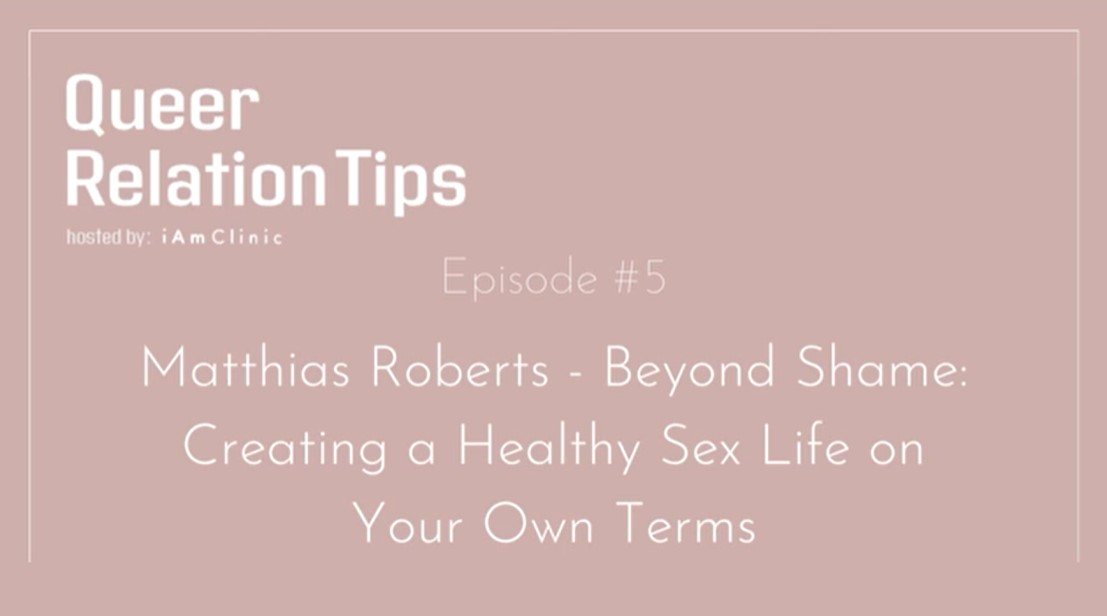Table Of Contents
- Beyond Shame: Creating a Healthy Sexual Ethic on Your Own Terms With Matthias Roberts
- TheImpact of Shame on Sexuality
- Beyond Shame: Matthias Roberts’ New Book
- Unpacking the Book’s Purpose
- Recognizing Shame in Our Lives
- Coping Mechanisms: Shamefulness, Shamelessness and Autopilot
- The Anatomy of a Healthy Sexual Ethic
- Vulnerability as a Path to Healing
- A Call for Change and Transformation
- Conclusion
Episode Summary
Host Isaac Archuleta and Matthias Roberts, counselor and podcast host of Queerology, talk about Roberts’ new book, Beyond Shame: Creating a Healthy Sex Life on Your Own Terms. They consider the shame that results from purity culture and ask questions one can consider in evaluating the presence of shame in one’s own life.
For information about how to become a guest, visit us at iAmClinic.org.
Beyond Shame: Creating a Healthy Sexual Ethic on Your Own Terms With Matthias Roberts
Shame is a powerful and complex emotion that affects many aspects of our lives, including our sexuality. For those who grew up in more conservative or evangelical Christian environments, shame around sex can be particularly intense and pervasive. The messages we received about sex and purity culture can leave deep scars, leading us to struggle with sexual shame even in our adult lives. But what if there’s a way to move beyond shame and create a healthy sexual ethic that aligns with our values and desires?
In this blog post, we’ll explore the concept of shame and its impact on our sexuality, dive into the work of Matthias Roberts, a counselor and author of the book “Beyond Shame: Creating a Healthy Sex Life on Your Own Terms,” and examine the paradoxes of a healthy sexual ethic. We’ll learn how to recognize shame, embrace vulnerability, and build a thriving sex life that aligns with our true selves.
The Impact of Shame on Sexuality
Shame is an emotion that can make us want to hide or turn away from ourselves. When shame intertwines with our sexuality, it can lead to shamefulness, where we try to control our sexuality to avoid feeling shameful. This coping mechanism can be a way to medicate shame temporarily, but it doesn’t address the underlying issues.
Queer Perspectives on Sexual Shame
For those within the queer community, sexual shame can take on unique dimensions. Growing up with messages that label same-sex attractions as sinful or impure can deeply impact one’s relationship with their sexuality. The struggle to reconcile religious beliefs with sexual orientation often leads to internal conflicts and emotional distress.
Beyond Shame: Matthias Roberts’ New Book
Matthias Roberts, a counselor from Washington state and host of the podcast “Queerology,” has written a groundbreaking book titled “Beyond Shame: Creating a Healthy Sex Life on Your Own Terms.” In this book, he addresses the sexual shame many experience within the context of purity culture and conservative religious backgrounds. The book offers insights and tools to navigate sexual shame and construct a healthier sexual ethic moving forward.
Unpacking the Book’s Purpose
The central focus of “Beyond Shame” is to explore how we can work with the sexual shame we’ve inherited and dismantle the lies around sex and sexuality. It encourages readers to build a more expansive and grounded sexual ethic that aligns with their authentic selves.
Pre-Order Bonuses
For those who pre-order the book, Matthias Roberts offers exciting bonuses, including a master class with Linda K. Klein, author of “Pure: Inside the Evangelical Movement That Shamed a Generation of Young Women and How I Broke Free.” The book club launch and other valuable resources further enhance the reader’s experience.
Recognizing Shame in Our Lives
As a clinician, Matthias Roberts acknowledges that many people might not even realize they are operating from a place of shame. They may feel hungry for connection and affirmation but struggle with pseudo confidence in their sexual behaviors. Identifying and understanding shame in the day-to-day life of a queer person is essential to begin the journey of healing.
Coping Mechanisms: Shamefulness, Shamelessness, and Autopilot
Roberts categorizes three coping mechanisms individuals use to navigate sexual shame: shamefulness, shamelessness, and autopilot. Shamefulness involves hiding or controlling sexuality to avoid shame, while shamelessness uses sexuality to escape underlying emotional work. Autopilot, on the other hand, represents a lack of awareness and conscious decision-making around sexual behaviors.
The Anatomy of a Healthy Sexual Ethic
Rather than prescribing a rigid set of rules for sexual ethics, Roberts believes in embracing paradoxes to navigate a healthy sexual ethic. Some of these paradoxes include recognizing that sex can be both healthy and risky and understanding how we can use sex to embrace vulnerability or avoid it.
Vulnerability as a Path to Healing
Embracing vulnerability and authenticity in our sexual experiences can be transformative. It allows us to shed the masks we wear and to show up just as we are, without shame or fear of rejection. By moving beyond shame and leaning into vulnerability, we create a space for meaningful connections and emotional intimacy.
A Call for Change and Transformation
Writing “Beyond Shame” was an emotional and challenging journey for Matthias Roberts. The book’s primary aim is to help individuals navigate sexual shame and build a healthier sexual ethic, particularly within the queer community. By sharing his vulnerability and insights, Roberts hopes to inspire others to take the path of healing and self-discovery.
Conclusion
Navigating sexual shame and constructing a healthy sexual ethic is a complex and deeply personal journey. Matthias Roberts’ book, “Beyond Shame: Creating a Healthy Sex Life on Your Own Terms,” offers a valuable resource for those seeking to move beyond shame and embrace their authentic sexual selves. By recognizing shame, embracing vulnerability, and leaning into paradoxes, we can build thriving and meaningful sexual experiences that align with our values and desires. Through awareness, self-compassion, and open dialogue, we can create a world where sexual shame no longer holds us back from living fulfilling and liberated lives.







